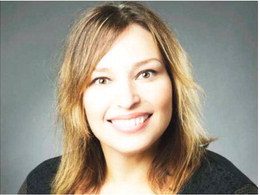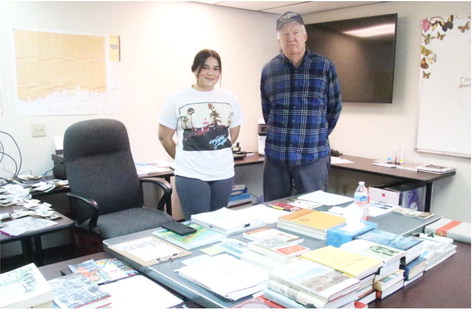Psychologist Awarded Grant To Test Substance Use Intervention For Fort Peck Reservation


After more than a decade spent studying addictive behaviors, psychologist Monica Skewes thought she had seen the complete spectrum of human addiction.
But even with her extensive experience investigating smoking, drinking and other addictions, Skewes was surprised when she arrived in Montana in 2014 to find many people in one American Indian community living in recovery against all odds. People healing from methamphetamine addiction, for example, lived among current users and somehow managed to stay drug-free.
“I couldn’t even conceive how they could do that,” said Skewes, associate professor in Montana State University’s Department of Psychology and a principal investigator for the Center for American Indian and Rural Health Equity, or CAIRHE. “There’s a resilience and strength that people have there, and ever since then I’ve been trying to understand what those strengths are and how they can help community members toward recovery.”
Although American Indians have one of the highest rates of abstinence from alcohol and drugs among any population, Native communities also experience serious health disparities associated with alcohol and drug use disorders, often a result of intergenerational and historical trauma, Skewes said.
Effective treatments are critically needed in these communities, she explained, but few evidence-based interventions have been developed or tested with American Indians and grounded in local culture. Even fewer take advantage of the communal strengths that Skewes and her community partners observe daily.
In March Skewes received a five-year, $3.2 million grant from the National Institute on Drug Abuse, part of the National Institutes of Health, to test one such treatment — a unique approach to recovery that she and her research team have developed over years of preliminary studies. By increasing access to effective localized treatment, she said this latest research could improve health and decrease disparities related to substance use disorders among under-served Native communities in Montana and nationwide.
“While there are many risk factors that drive substance use on reservations, like high rates of poverty and easy access to alcohol, there are also unique strengths that we believe help people recover,” Skewes said. Two examples she cited are strong cultural leaders engaged in language and cultural revitalization, as well as community members in long-term recovery who are committed to serving their people and helping others.
“Our intervention aims to connect tribal members with existing resources in the community and increase their access to a healthy social support network,” Skewes added.
The new study, called “Randomized Controlled Trial of Indigenous Recovery Planning for American Indians,” uses a community- based participatory research framework, or CBPR, to test the intervention that was designed collaboratively with community partners from the Fort Peck Indian Reservation in northeastern Montana. The grant includes a large subaward to Fort Peck Community College in Poplar for work carried out on the reservation.
Known as Indigenous Recovery Planning, or IRP, the intervention employs trained Fort Peck community members to deliver content that has been adapted to the local culture from Relapse Prevention, one of the most studied and effective treatments for substance use disorders, Skewes said.
“While Relapse Prevention is an effective treatment for substance use disorders, the focus is on relapse and how to avoid it,” she explained. “Through working with community partners, we learned that focusing on the positive goal — recovery — is more aligned with cultural values and practices than focusing on the negative. So our intervention is focused on planning for recovery and building a full, rich, satisfying life that’s incompatible with substance use.”
The goal of the intervention, Skewes said, is to provide opportunities for participants to reconnect with their families, community and culture as they recover.
“By building up protective factors, like a strong cultural identity and sense of belonging to the community, there will be less space available for substance use and more support for recovery,” she said.
Using data from Skewes’s four CAIRHE-supported preliminary studies, which date from 2014 to the present, the team has worked closely with a community advisory board at Fort Peck to understand what the community believes causes addiction and how tribal members recover from substance use problems, often without formal treatment. The risk and protective factors the team identified in those studies will be the focus of the Indigenous Recovery Planning intervention.
“Infusing cultural content into a pilot adaptation of Relapse Prevention was critical, as we continue to see evidence of cultural identity as a resiliency factor for American Indians,” said Adriann Ricker, Skewes’ longtime research collaborator at Fort Peck and a member of the local advisory board. “Through storytelling, language lessons and smudging, an energy cleansing practice, we were able to highlight the collective resilience in every participant’s history and provide them with tools and resources for cultural restorative pathways on the Fort Peck Reservation.”
Over three years, Skewes’ team will test the effectiveness of IRP in a clinical trial among 150 tribal members with substance use disorder. The study will assess if and how IRP changes alcohol and drug use, as well as how it influences related outcomes, such as quality of life. In addition, the research will examine the effects that certain cultural factors — such as American Indian identity, spirituality and communal mastery — may have on treatment.
At the end of the study, they’ll evaluate IRP’s acceptance in the community. That’ll help Skewes and her team adapt it to other communities with similar cultural values and barriers to treatment.
“I’ve seen the damage that substance use problems have caused for Native families and communities, and the devastation people experience when they lose relatives to addiction,” Skewes said. “But addiction is a treatable chronic health problem, and people can and do recover. There are many pathways to recovery, and what works for one person may not work for another.”
Skewes hopes the research will open new avenues to wellness that community members might not currently know how to access. “Rather than trying to deliver a solution, we hope to expand opportunities and provide alternatives to people who can then find a way that works for them,” she said.
Ian Handley, chair of the Department of Psychology, also said that Skewes’s latest work has “considerable potential to positively impact Native communities.”
“This grant award serves as a testament to the importance of the team’s foundational and future work, and it exemplifies the significance of what can be achieved by collaborations between MSU researchers and the tribal communities in Montana,” he said.
Alexandra Adams, director of CAIRHE and a co-investigator on Skewes’s project, said Skewes has excelled at CBPR by placing the needs and voices of her partner community at the forefront of her research.
“This has been a team effort with Fort Peck since Monica’s first meetings in the community in 2014,” Adams said. “That’s the way CBPR has to be done, and she’s a leading example for faculty across Montana and the nation.”
In 2019, Skewes, Ricker and Elizabeth Rink of MSU’s Department of Health and Human Development were selected for the Interdisciplinary Research Leaders Program supported by the Robert Wood Johnson Foundation. The three have used the program to collaborate with Fort Peck community members and lawmakers to develop effective, compassionate and health-promoting policies that acknowledge the multiple sources of trauma affecting Fort Peck tribal members.


